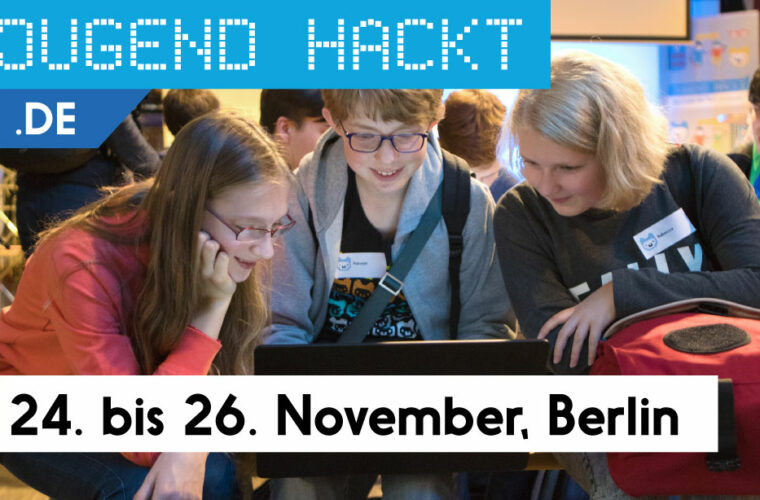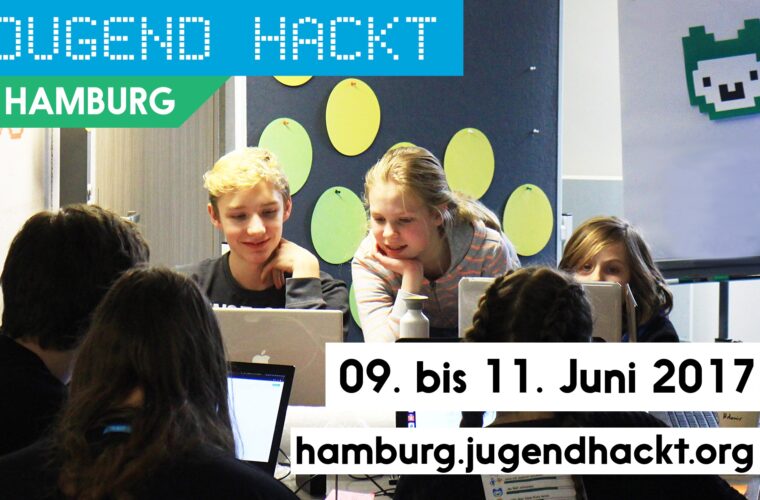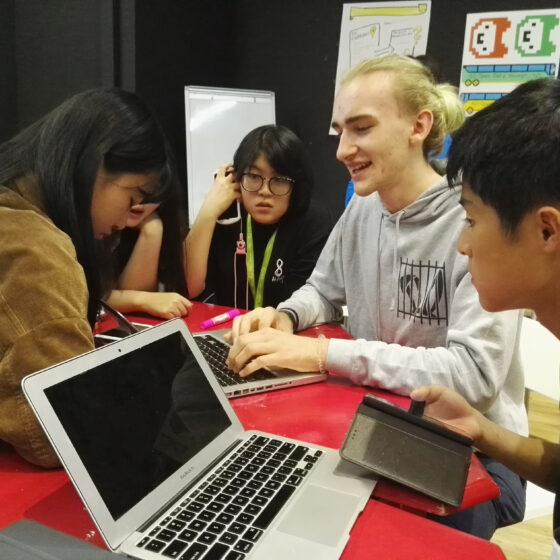
Vernetzte Welten in Indien und Sri Lanka
Wir freuen uns sehr, unsere Kooperation mit dem Goethe-Institut ausweiten zu können: Nachdem wir die letzten Jahre in Ost-Asien unterwegs waren und dort zahlreiche Schüler*innen-Austausche in Form von Jugend hackt-Hackathons in Seoul, Taipeh, Hongkong und Tokyo durchgeführt haben, zieht es uns jetzt auch nach Süd-Asien.
Eine kleine Gruppe von fünf Jugendlichen und drei Mentor*innen wird im April in gleich zwei Hackathons in Folge indischen Jugendlichen und Mentor*innen begegnen, um dort das Thema „Food Revolution“ zu bearbeiten. Wir sind sehr gespannt auf Neu-Delhi und Kolkata und wie anders dort der Blick auf Essen und Ernährung sein wird. Im Text am Ende seht ihr schon mal, welche Fragestellungen sich hier auftun. Welche Lösungen die Teilnehmenden wohl dafür finden werden?
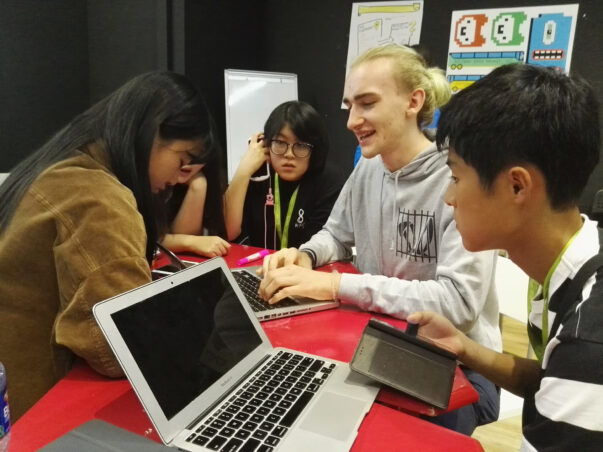
Vor den beiden Veranstaltungen in Indien gibt es noch einen dritten Hackathon in Sri Lanka, dort werden „nur“ zwei deutsche Mentor*innen und Jugendliche und Mentor*innen aus Colombo teilnehmen. Drei Hackathons in Folge schien uns dann doch bei aller Begeisterung für Jugend hackt zu viel, soll daneben ja auch noch Energie bleiben, um die vielen Eindrücke aufzunehmen, die Länder wie Indien und Sri Lanka zu bieten haben.
Schon Anfang April geht es los, wir werden natürlich alles fleißig dokumentieren und in einer gemeinsamen Abschlussveranstaltung am 12. April zusammenfassen, darüber informieren wir euch dann noch rechtzeitig.
Nun werdet ihr euch fragen: Indien ohne mich? Habe ich eine Ausschreibung verpasst? Nein, es gab dieses Mal keine. Wir sind auf einzelne Teilnehmende zugegangen und haben gefragt, ob sie mitkommen möchten. Das hat zwei Gründe: Zum einen war alles recht kurzfristig und zum anderen hatten wir nur fünf Plätze und Angst, mehr Absagen und Enttäuschungen als Freude zu produzieren. Aber keine Sorge, so ging es auch in Ost-Asien mit einer kleinen ausgewählten Gruppe los, im Folgejahr hatten wir dann eine große Ausschreibung und konnten zahlreiche weitere Menschen mitnehmen. Drückt die Daumen, dass das auch dieses Mal wieder gelingt!
Die Ergebnisse unserer Kooperationen mit dem Goethe Institut der letzten Jahre gibt’s auf Vernetzte Welten.
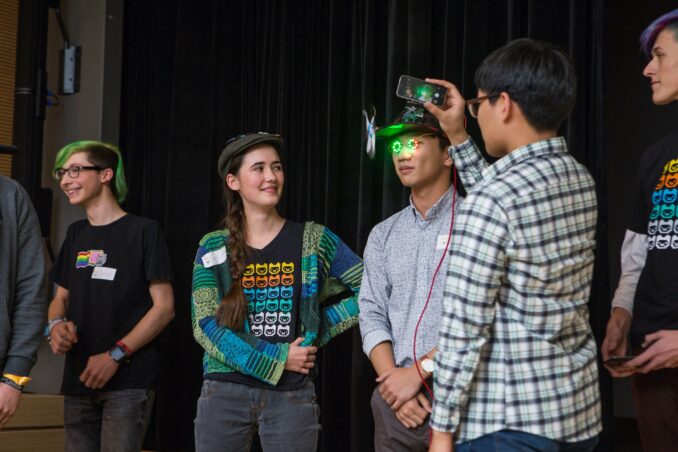
Die wichtigsten Daten unserer Reise im Überblick:
- Colombo: 1.–3. April
- Neu-Delhi: 5.–7. April
- Kolkata: 9.–11. April
- Abschlusspräsentation im Livestream (und Aufzeichnung): 12. April
- Thema: Food Revolution
- Hashtags: #jhasien #vernetztewelten
Wir werden regelmässig auf Twitter und in unseren Insta-Stories berichten!
Aufzeichnung der Abschlusspräsentation:
Und hier der Text, der das Thema und die Probleme hier vor Ort verdeutlicht:
Food Challenges: Recent scenario in the South Asian countries
Food security is one of the global phenomenon and the greatest challenges that our society is facing today. Food security can be thought of as an umbrella term for three interconnected concepts: The security aspect focuses on availability and access – ensuring everybody across the world gets enough food to eat. Food safety focuses on ensuring people have healthy, nutritious food that is free from contamination or degradation. Food sovereignty empowers people to make their own choices about the food they eat, for example by buying regional produce or growing their own food. The challenge, therefore, is not just producing enough food but ensuring it reaches those who need it, it is nutritious, and can be grown and distributed in a sustainable manner in the face of a changing climate.
South Asian countries such as India and Sri Lanka have been facing food related problems as well water pollution and its scarcity for a long period. On the one hand, the majority of the population lives below the poverty line in rural areas and derives the livelihood from agriculture. However, low agricultural productivity, poor transportation systems, shortage of water and unfavorable policies affect their production and agriculture trade. Today, a majority of this part of the population is undernourished, while more than a million tons of food never make it to the table. In addition, water scarcity in India is expected to worsen as the overall population is expected to increase to 1.6 billion by year 2050. On the other hand, in the metropolitan cities such as Colombo, Kolkata and Delhi the situation is similar. Yet the middle and upper class of the society faces challenges such as water borne diseases, unhealthy eating habits, water contamination, dependency on packaged food and poor cooking practices. Specially, millennials are majorly affected.
There is a drastic change in the Food Habits of South-Asian Millennials. The dining out culture in India has changed drastically, and the changing food habits of the millennial generation in metropolitan areas has had a significant contribution towards this trend. Millennials or the Generation Y are people between the ages 18 and 35. They are the people who are tech-savvy, are constantly exposed to the global trends and lifestyles, are well read, have extensively traveled and have high spending power. And, they are also the ones who are driving the growth index of the restaurant industry. The trend of splitting bills, or ‘Going Dutch’ has also caught on, where the people equally split the bill among themselves. Millennials’ food habits are different from that of the Baby Boomers, and thus have a significant impact on the restaurant business. Over the past few years, India has witnessed a proliferation of fine dining restaurants, cafes, pubs, bars, clubs, lounges, and international fast food joints, which have to come up to cater to the Millennials’ changing food habits.
In the city Kolkata (East part of India) the major food related problems can be summed as follows: Food availability is a big question resulting into the threat of malnutrition. Apart from that, poor cooking practices and traditions of food consumption practices play mammoth a role as the other factors themselves. For instance, there has been a recent shift in the home cooking trends. People now prefer to order food from restaurants, rather than preparing the food by themselves. Especially youngsters and service class are now more dependent on the services of food delivery apps Swiggy, Ubereats and zomato. Further, the other factors like consumption of street food, where the hygiene and myths relating to the nutritional values of these foods are big question marks. Such type of food result into various food allergies and raises the question, which are the safe food produce and genetically modified foods? The themes like cultural tolerance invoked by food choices due to religion and communities also contributes to this issue.
Whereas in the capital city of India, Delhi (North part of India) there other challenges as well. For instance, there is a deficiency in the nutrient content of the diet of average Delhiites. Delhi kids love to eat junk food, which results to obesity in kids. Packaged food is fast replacing balanced diet among schoolchildren. Further, north India is known for its lavish parties, birthdays to weddings. Huge amount of food is wasted on such occasions. On the contrary, there are still lots of people dying because of starvation. Not only that, crop burning is also a one of the burning topics which results into climate change and unhealthy air quality. Furthermore, climate changes also play a major role. It further damage the standing crops and have ultimately led to poor yield of crops. This leads to high prices.
In the Sri Lankan capital city Colombo, unhealthy food and eating practices are the major contributor for conditions like obesity, diabetes etc. There is decline of traditional food and replaced by fast food which is trendy – especially among youth. Food allergies are growing (e.g. lactose intolerance) due to recent change in the cooking practice at home decline. Due to the fact that both parents are working. Further, cultural habits: as Sri Lanka is a hospitable country, food place a major role in social life – however, the food is often heavy and oily e.g. pastries.

